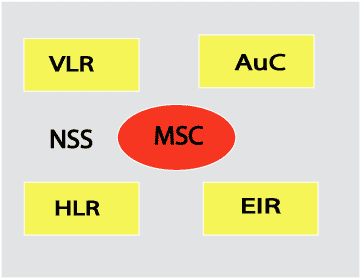The Network switching system (NSS), the main part of which is the Mobile Switching Center (MSC), performs the switching of calls between the mobile and other fixed or mobile network users, as well as the management of mobile services such as authentication.

The switching system includes the following functional elements:
Home Location Register (HLR)
The HLR is a database used for storage and management of subscriptions. The HLR is considered the most important database, as it stores permanent data about subscribers, including a subscriber's service profile, location information, and activity status. When an individual buys a subscription in the form of SIM, then all the information about this subscription is registered in the HLR of that operator.
Mobile Services Switching Center (MSC)
The central component of the Network Subsystem is the MSC. The MSC performs the switching of calls between the mobile and other fixed or mobile network users, as well as the management of mobile services such as registration, authentication, location updating, handovers, and call routing to a roaming subscriber. It also performs such functions as toll ticketing, network interfacing, common channel signaling, and others. Every MSC is identified by a unique ID.
Visitor Location Register (VLR)
The VLR is a database that contains temporary information about subscribers that is needed by the MSC in order to service visiting subscribers. The VLR is always integrated with the MSC. When a mobile station roams into a new MSC area, the VLR connected to that MSC will request data about the mobile station from the HLR. Later, if the mobile station makes a call, the VLR will have the information needed for call setup without having to interrogate the HLR each time.
Authentication Center (AUC)
The Authentication Center is a protected database that stores a copy of the secret key stored in each subscriber's SIM card, which is used for authentication and ciphering of the radio channel. The AUC protects network operators from different types of fraud found in today's cellular world.
Equipment Identity Register (EIR)
The Equipment Identity Register (EIR) is a database that contains a list of all valid mobile equipment on the network, where its International Mobile Equipment Identity (IMEI) identifies each MS. An IMEI is marked as invalid if it has been reported stolen or is not type approved.


0 Comments
Post a Comment